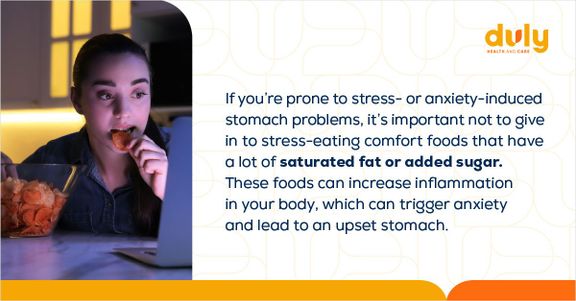Your to-do list is longer than a certain drugstore receipt. Everything feels like it’s piling up around you. You feel like you don’t have the bandwidth to do everything that needs to be done.
It’s easy to see — you’re stressed.
But sometimes, stress creeps up on you. Your body may start to recognize that you’re getting stressed and try to warn you. Here’s what you need to know about the early signs of stress building up that you might not be familiar with, and what you can do about it.
Also read: How Does Stress Affect The Body? Take This Quiz to Find Out!
Those pounding headaches could be the product of stress.
Tension headaches cause discomfort or pain in your head, neck, or scalp. They’re the most common type of headache — and one of their main sources is stress.
There is some debate about the exact cause of a tension headache. Many researchers believe that the muscles between your neck and head knot up, get tense, and contract, eventually leading to tightened muscles in your scalp. Others believe that the reason certain people get tension headaches is that they are more sensitive to pain. Whatever the cause, most researchers agree that stress is one of the most common triggers.
In addition to managing stress (more on that later), there are several ways to prevent tension headaches:
- Make sure you’re using good posture when working or reading.
- Stretch out your shoulders, neck, and back when you’re doing close-up work, like typing or using a computer.
- Try a different pillow or a new sleeping position.
- Watch your caffeine intake. While some caffeine can help curb headaches, too much can actually cause them.
- Give up smoking. Nicotine in cigarette smoke decreases blood flow to your brain and can cause a reaction in the nerves in your throat, causing a headache.
In some cases, your provider may also prescribe medication to prevent or reduce headaches.
To learn about keeping your stress levels in check, schedule an appointment with a Duly Health and Care behavioral health specialist or your primary care provider.
Stress might be why you’re running to the bathroom.
Many people notice digestive problems like stomach aches when they’re nervous about something like a job interview or public speaking. That “butterflies in your stomach” feeling can also come from stress. This is much thanks to the “gut-brain connection.”
When your brain determines that you’re stressed, it sends signals that stimulate the production of certain hormones and chemicals. Some of these may make their way into your digestive tract, where they interact with tiny microorganisms that help with digestion (gut flora). This results in a chemical imbalance that can cause problems like:
- Indigestion
- Loss of appetite
- Increased hunger
- Nausea
- Constipation
- Diarrhea
- Irritable bowel syndrome (IBS)

Also read: Stress In Your Body
If you’re feeling tired all day, stress may be the culprit.
Stress is a common cause of insomnia — difficulty falling or staying asleep, or getting good quality sleep. If you have racing thoughts or are running through everything that needs to get done, it can be hard to fall asleep. And even if you fall asleep easily, stress can disrupt how much rest you actually get. When you fall asleep while stressed, your body may stay in an alert state and cause you to wake up at the slightest sign of noise or discomfort. The next day, you may notice insomnia symptoms such as:
- Sleepiness during the day
- Difficulty concentrating or remembering
- Feeling anxious, depressed, cranky, or easily irritable
- Delayed responses, like not reacting quickly enough while driving a car
- Confusion
When stress is affecting your sleep, it’s even more important than usual to pay attention to your sleep hygiene and environment so that nothing else is contributing to insomnia. You can set yourself up for a successful sleep in a number of ways, including meditation and setting a moderate room temperature (about 60 to 67 °F). Also try to avoid screen time, alcohol, caffeine, large meals, or nicotine before going to bed.
Also read: Can’t Fall Asleep? It May Be Your Sleep Environment
New health problems that you can’t explain? You guessed it — it may be stress.
Headaches, digestive issues, and problems with sleep are only a few of the ways in which your body cues you that you’re stressed. Some lesser-known signs include:
- Jaw pain (from grinding your teeth)
- Missed or irregular menstrual periods
- Excessive sweating
- Losing more hair than usual
- Decreased sex drive
- Trouble fighting off infections and colds
Stress doesn’t need to take over your life.
One of the best ways to avoid the effects of stress is to nip it in the bud or prevent it from happening in the first place. There are many methods for combating stress, including:
- Getting 7 to 9 hours of sleep per night.
- Practicing mindfulness — when you’re aware of, and accepting without judgment, everything that’s happening in the moment within your body and your surroundings.
- Exercising. Physical activity releases “feel-good” hormones that can help you relax and relieve tension.
- Taking time for yourself to do the things you enjoy, like listening to a podcast or reading
- Adopting a balanced diet that includes fermented foods (like plain yogurt) and foods that are high in omega‑3 fatty acids and fiber.
You don’t have to fight stress alone. If you are frequently stressed or it’s taking a toll on your health, you may benefit from working with a mental health professional like a therapist or counselor. They can help you learn more about your personal stress triggers and how you can fight off stress.
So next time you’re going through bouts of headaches or sleepless nights, listen to your body. It may be letting you know that it’s time to focus on controlling your stress.
Health Topics:








